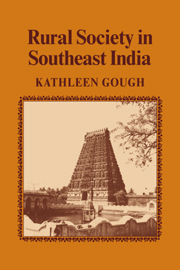Book contents
- Frontmatter
- Contents
- Preface
- Part I Thanjāvūr
- Part II Kumbapeṭṭai
- 8 The Face of the Village
- 9 Kumbapeṭṭai before 1855
- 10 Kumbapeṭṭai from 1855 to 1952
- 11 The Annual Round
- 12 Economics and Class Structure: The Petty Bourgeoisie
- 13 Independent Commodity Producers and Traders
- 14 The Semiproletariat
- 15 Village Politics: Religion, Caste, and Class
- 16 Village Politics: The Street Assembly
- 17 Class Struggle and Village Power Structure
- Part III Kirippūr
- Notes
- Glossary
- Bibliography
- Index
- CAMBRIDGE STUDIES IN SOCIAL ANTHROPOLOGY
16 - Village Politics: The Street Assembly
from Part II - Kumbapeṭṭai
Published online by Cambridge University Press: 29 October 2009
- Frontmatter
- Contents
- Preface
- Part I Thanjāvūr
- Part II Kumbapeṭṭai
- 8 The Face of the Village
- 9 Kumbapeṭṭai before 1855
- 10 Kumbapeṭṭai from 1855 to 1952
- 11 The Annual Round
- 12 Economics and Class Structure: The Petty Bourgeoisie
- 13 Independent Commodity Producers and Traders
- 14 The Semiproletariat
- 15 Village Politics: Religion, Caste, and Class
- 16 Village Politics: The Street Assembly
- 17 Class Struggle and Village Power Structure
- Part III Kirippūr
- Notes
- Glossary
- Bibliography
- Index
- CAMBRIDGE STUDIES IN SOCIAL ANTHROPOLOGY
Summary
In 1951 the corporate groups of village politics were, in the main, the territorial groups of the village and its component streets. Some separate political activity went on within each regional endogamous subcaste, encompassing many villages. This activity was chiefly concerned with boycotting people who disobeyed the group's rules of religious purity. The subcaste, however, both within the village and within the endogamous group as a whole, was mainly a loose network of interfamilial relations of kinship and affinity.
The men of each street settled a number of disputes among themselves without resort to any other authority. Women were excluded from these settlements and from judgments connected with the village at large. Because women were regarded as legal minors under the guardianship of their fathers or their husbands, it was thought proper for these men to chastise them privately by scolding or beating them if they did wrong. Quarrels among women were disregarded by the street assemblies unless they led to disputes among men.
The Paḷḷar streets were the most tightly organized, the Non-Brahman less so, and the Brahman least of all. This puzzled me at first, especially because the Brahmans administered the village in addition to their own streets. One reason may have been that the Brahman leaders often imposed collective punishment on the Paḷḷar streets for individual offenses, and sometimes did this in relation to the older Non-Brahman streets of Adichēri and Barber Street.
- Type
- Chapter
- Information
- Rural Society in Southeast India , pp. 304 - 317Publisher: Cambridge University PressPrint publication year: 1982



